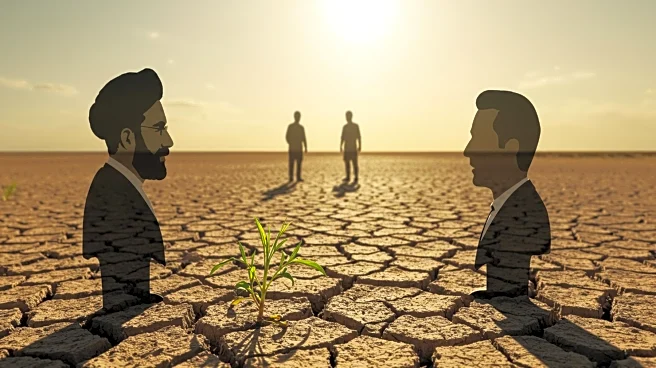What's Happening?
Iranian President Masoud Pezeshkian has publicly criticized Israeli Prime Minister Benjamin Netanyahu's offer to assist Iran with its ongoing water crisis. Netanyahu made the offer contingent upon Iran freeing itself from its current regime, highlighting Israel's achievements in water management, including recycling 90% of its wastewater and advancements in desalination technology. Pezeshkian dismissed Netanyahu's comments as hypocritical and disdainful towards the Iranian people, emphasizing the harsh conditions Iranians face during the summer heat without access to clean water.
Why It's Important?
The exchange between Pezeshkian and Netanyahu underscores the ongoing geopolitical tensions between Iran and Israel. Netanyahu's remarks are part of a broader strategy to encourage Iranian citizens to seek regime change, leveraging Israel's technological prowess as a potential benefit. This situation highlights the intersection of environmental challenges and political dynamics in the region, with water scarcity being a critical issue that could influence public sentiment and international relations. The discourse also reflects the broader narrative of regional power struggles and the use of humanitarian issues as leverage in political rhetoric.
What's Next?
The situation may lead to increased diplomatic tensions between Iran and Israel, potentially affecting regional stability. Iran's response to Netanyahu's offer could influence its domestic policies regarding water management and international cooperation. Additionally, the international community may monitor these developments closely, considering the implications for regional security and humanitarian conditions. Stakeholders, including environmental organizations and political leaders, may advocate for solutions that prioritize humanitarian needs over political agendas.
Beyond the Headlines
The water crisis in Iran is a significant environmental challenge that has broader implications for regional stability and human rights. The politicization of such issues can hinder effective solutions and exacerbate existing tensions. This situation raises ethical questions about the use of humanitarian aid as a political tool and the responsibilities of nations to address global environmental challenges collaboratively. Long-term, the focus on water management could drive technological innovation and international partnerships aimed at sustainable solutions.












